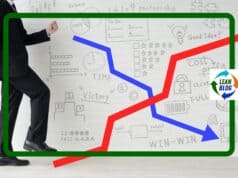People often say Lean is pretty simple (or that it's just “common sense“). Yeah, some of the concepts are simple… but sometimes deceptively so. Or, we find that it's easier to describe Lean (as a management system, a set of methods, and a culture) than it is to say how an organization should transform itself from here to there.
 It can be a challenge to succinctly describe and explain Lean, whether that's in a single article or an hour-long talk. There's always so much you want to explain in terms of concepts, stories, and examples. I've written a short “What is Lean?” page that includes links to the Lean Enterprise Institute, Toyota, and the first chapter of my book Lean Hospitals. My readers have also tried to give short descriptions of Lean as comments on this post.
It can be a challenge to succinctly describe and explain Lean, whether that's in a single article or an hour-long talk. There's always so much you want to explain in terms of concepts, stories, and examples. I've written a short “What is Lean?” page that includes links to the Lean Enterprise Institute, Toyota, and the first chapter of my book Lean Hospitals. My readers have also tried to give short descriptions of Lean as comments on this post.
Yesterday, I saw that Dan Jones tweeted out a link to his attempt to describe and explain Lean in 2000 words.
My summary of #lean in 2,000 words – does this resonate with your experience? http://t.co/pDL2TV5329
— Daniel T Jones (@DanielJonesLean) September 28, 2014
Dan was, of course, part of the MIT research team that coined the term “Lean” just over 25 years ago.
Many people (including the author of this recent article) make a point that Lean and the Toyota Production System are not the same thing. Some argue Lean is derivative and, therefore, different. I've heard Jim Womack say that they had to create a generic term or, otherwise, it would be more difficult to get people to accept Toyota's methods (although the term “lean” sometimes gets in the way or has negative connotations).
From what I've seen, Toyota doesn't really embrace the term “Lean,” as they should, of course, use terms like the Toyota Production System, the Toyota Way, and the Toyota Product Development System. Toyota's corporate website acknowledges (and doesn't fight) the idea that Lean and TPS are basically synonyms:
Toyota Motor Corporation's vehicle production system is a way of “making things” that is sometimes referred to as a “lean manufacturing system” or a “Just-in-Time (JIT) system,” and has come to be well known and studied worldwide.
Of course, I'd disagree that TPS or Lean is about “making things,” as the methods and principles have been used in so many non-production and service settings.
Dan Jones, in his piece, says:
Lean thinking and practice are generic versions of the Toyota Production System (TPS) and the Toyota Way management system (2). Lean did not derive from theory but through observing practices at Toyota that were delivering superior performance in terms of product quality, efficiency (hours per car) and time to market for new products, leading Toyota to eventually become the largest car maker in the world.
See the rest of the article here, as it's a good overview.
I always encourage people to read about Lean and Toyota, as summarized or written about by different sources. These different perspectives and interpretations allow you to synthesize a view of Lean that makes sense to you and your company (although if things stray too far from accepted Lean or Toyota principles, it might become “L.A.M.E.” instead).
Reading the works of Ohno and Shingo and more recent books like Toyota by Toyota give a “straight from the source” perspective. People who worked at Toyota (like Pascal Dennis or John Shook) or those who studied them directly (like Norm Bodek, Masaaki Imai, Jeff Liker, Steve Spear or Dr. John Kenagy) add to the literature. There are professors, like Mike Rother and Bob Emiliani with great things to say. There are so many other good books out there (my apologies to those I've not mentioned)… and there's some misinformed crap (mainly in the “Lean Sigma” genre). Oh, and you should also read books by and about W. Edwards Deming to fully understand Lean.
Oh, but Lean is simple? I've been studying and practicing Lean for 20 years and I'm still learning and stitching this together in my own mind, based on former Toyota people I've worked with, leaders from other great Lean organizations that I've worked with or learned from, and all the other forms of learning through books and my own experiments.
What do you think about Dan's short explanation of Lean? What else would you add? What else would you read?
Please scroll down (or click) to post a comment. Connect with me on LinkedIn.
Let’s work together to build a culture of continuous improvement and psychological safety. If you're a leader looking to create lasting change—not just projects—I help organizations:
- Engage people at all levels in sustainable improvement
- Shift from fear of mistakes to learning from them
- Apply Lean thinking in practical, people-centered ways
Interested in coaching or a keynote talk? Let’s start a conversation.







![When Was the Last Time a Leader Around You Admitted They Were Wrong? [Poll]](https://www.leanblog.org/wp-content/uploads/2025/07/Lean-Blog-Post-Cover-Image-2025-07-01T212509.843-100x75.jpg)


Dan says: “From the above it should be clear that lean is not just another improvement methodology, but a very different set of behaviours and management system. It is not just a set of tools for production operations…”
From what I know, the two retailers cited in Dan’s article as Lean exemplars have succeeded in the application of Lean tools for operations (the improvement methodology), but have failed at in instituting “a very different set of behaviours and management system.”
Two important quotes come to mind (both from 2007):
“Our way of thinking is very difficult to copy or even to understand.” – Fujio Cho, former Toyota Chairman
“There’s no end to the process of learning about the Toyota Way. I don’t think I have a complete understanding even today, and I have worked for the company for 43 years.” – Katsuake Watanabe, former President of Toyota
To better understand the leader’s mindset (beliefs) that results in a “very different set of behaviours and management system,” I suggest reading:
1) Toyota’s Corporate Social Responsibility Concenpts http://www.toyota-global.com/sustainability/csr_initiatives/csr_concepts/policy.html and
2) Moving Forward Faster: The Mental Evolution from Fake Lean to REAL Lean